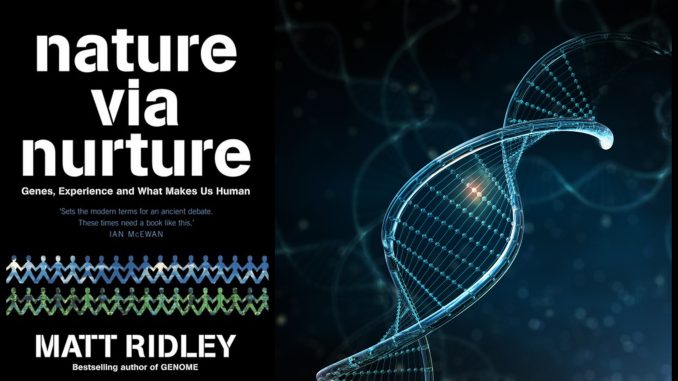
“An unrivalled view of cutting-edge research into the roots of human behaviour.” – Financial Times
“Profoundly intelligent and persuasive.” – Sunday Times
For the longest time, we’ve wondered about what makes us who we are. How much of a role does nature play in shaping our personality? What impact do our genes have in making us who we are? The nature v/s nurture debate has mystified the best minds of the previous century. However, in 2002 we decoded the human genome. This was an extraordinary achievement by any standard. Since then, we’ve had revolutionary new insights into how our genes work. In his incredibly insightful book, Nature via Nurture, Matt Ridley makes the point that it isn’t a case of nature versus nurture, but rather, it’s a case of nature via nurture.
Systematically, and with the aid of numerous anecdotes, case studies, summaries of ingenious experiments, and fascinating historical accounts, Ridley helps the reader come to the understanding that humans are a paradoxical creature that can be simultaneously free-willed and yet motivated by instinct and culture. He shows us that nurture depends on genes and, in turn, genes need nurture.
Ridley shows us that Human nature is far more complex than we first suspected. To help us get a full account of human nature, Ridley takes the reader on a historical tour of 12 men who put together the chief theories of human nature that came to dominate the twentieth century: Human nature, we learn, is influenced by a combination of Darwin’s universals, Galton’s heredity, William James’ instincts, De Vrie’s genes, Pavolov’s reflexes, Watson’s associations, Kraepelin’s history, Freud’s formative experience, Boas’ culture, Durkheim’s division of labour, Piaget’s development, and Lorenz’s imprinting.
Through numerous studies done with siblings, and identical and fraternal twins raised together and separated at birth, Ridley also shows us that it does not matter if one’s family is big or small, rich or poor, gregarious or solitary, old or young. “A family is a bit like vitamin C: you need it or you will become ill, but once you have it, consuming extra does not make you healthier.”
Ridley is at pains to help the reader realise that genes are not the puppet masters of fate we once thought them to be. He emphasises that genes are at the mercy of our behaviour; not the other way round. Even memory is ‘in the genes’ – in the sense that it uses genes (not in the sense that we inherit memories).
Nurture is effected by genes just as much as nature is. “The more we discover genes that influence behaviour, the more we find that they work through nurture; and the more we find that animals learn, the more e discover that learning works though genes,” says Ridley.
In an enthralling chapter on the influence of culture, we learn that the reason humans – and not other primates – dominate the planet lies not in the 5% difference in our genes but rather in our ability to accumulate culture and transmit information across the seas and across generations.
He points out that, “Trade and exchange of ideas play the same role in cultural evolution that sex plays in biological evolution. Sex brings together genetic innovations made in different bodies; trade brings together cultural innovations made in different tribes. As soon as humans had symbolic communication, the cumulative ratchet of culture could begin to turn: more culture demanded bigger brains; bigger brains allowed more culture.”
Genes are cogs in the machine, not gods in the sky. Switched on an off throughout life, by external and internal events, their job is to absorb information from the environment at least as often as to transmit it from the past. Genes do more than carry information; they respond to experience.”
He then goes on to analyse the seven different meanings of ‘gene’ and concludes the book with an outstanding exposition on seven morals about genes:
Moral 1: Genes are enablers not constrainers. (They create new possibilities for the organism; they do not cut down its options.)
Moral 2: Being a good parent still matters.
Moral 3: Individuality is the product of aptitude reinforced by appetite.
Moral 4: Egalitarians should emphasise nature; snobs should emphasise nurture.
Moral 5: The more we understand both our genes and our instinct, the less inevitable they seem.
Moral 6: Social policy must adapt to a world in which everybody is different.
Moral 7: Free will is entirely compatible with a brain exquisitely prespecified by, and run by, genes.
He also cites and celebrates numerous experiments on or with animals that give us deep and profound insight into human nature: Lorenz’s goslings, Harlow’s monkeys, Mineka’s toy snakes, Insel’s voles, Zipursky’s flies, Rankin’s worms, Holt’s tadpoles, Blanchard’s brothers, and Moffitt’s children. We learn from each and every one of these experiments that genes work by reacting to experience.
Genes are not our hard-wired masters, he concludes, but “the epitome of sensitivity, the means by which creatures can be flexible, the very servants of experience.”
This book is an enthralling, engaging, riveting account of how genes build brains to absorb experience. It is also an intellectually satisfying explanation for why we can be so different from other primates despite sharing 99% of their genetic material. Nature versus nurture is dead, Ridley informs us. Long live nature via nurture.